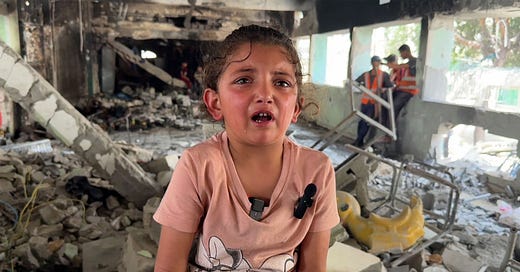There are some things that should never be hard to say.
Burning children alive is wrong.
Starving a population is wrong.
Targeting journalists, bombing hospitals, bulldozing homes — wrong, wrong, wrong.
Not because it’s complicated. Not because it depends on context. Just wrong.
And yet, somehow, the more obvious it is, the more distorted the conversation becomes. The more grotesque the violence, the more elaborate the excuses. The more unbearable the images, the more desperate the effort to look away.
This is what moral clarity feels like in a time of mass moral confusion. You find yourself saying things that should be obvious. You find yourself being called things that shouldn’t mean anything. Antisemitic. Terrorist sympathizer. Nazi. These words used to mean something. Now they’re used to smother meaning.
When the facts are unspeakable, the labels become the story.
It’s not a secret what’s happening in Gaza.
It’s not a fog of war. It’s not one side says this, the other says that.
It’s mass death, delivered in high definition.
We are watching, in real time, an entire population being suffocated. Their children incinerated. Their bodies crushed under rubble. Their food withheld. Their water poisoned. Their memories erased. Their future denied.
And still — somehow — it’s framed as controversial to care.
We are told to “condemn both sides.” As if this is a dispute between equals. As if the people living in open-air prison camps, bombed with American weapons, are in any position to be symmetrical. We are told to think carefully, to consider the nuance, to be sensitive to feelings — but never the feelings of the families burying their toddlers in plastic bags. Only the feelings of those whose comfort depends on never naming what’s happening.
Ethnic cleansing is not a debate.
It is not “one of the most complex conflicts in the world.” That’s a PR line.
It is the oldest, simplest story in the world: Power takes what it wants, and invents reasons later.
For a long time, support for Israel was a given in the West.
It was a patriotic position. A bipartisan one. Hollywood, the media, the universities — all aligned. To question it was to mark yourself as unserious at best, subversive at worst. But that’s changing.
Not because the institutions have changed. They haven’t. Not because the politicians have seen the light. They won’t. It’s changing because regular people are seeing the images and refusing to look away.
Because when you witness a child’s last breath, when you hear a mother scream into dust, when you count the bodies and see the names — something in you hardens. Not in cruelty. In clarity.
Some things are just wrong. And if your politics can’t say that plainly, then your politics are useless.
This is what’s so disorienting.
We live in an age where genocide is live-streamed and called self-defense. Where journalists are slaughtered and it’s treated as a footnote. Where aid is blocked, lies are repeated, and every institution that once claimed moral authority is exposed as hollow.
A former ambassador posts selfies in front of razed neighborhoods. A tech CEO jokes about population control. A senator demands that campus protesters be “dealt with” like foreign enemies. These aren’t slips. They’re masks coming off.
There’s no longer even the pretense of moral high ground. Just the brute logic of power: We can do this. Who will stop us?
And the answer tragically, predictably is no one.
Not the UN. Not the US. Not the media outlets obsessed with tone over truth. The empire funds it, shields it, justifies it. The same empire that taught us to fear evil is now perpetrating it. The same one that warns about extremism radicalizes people with its silence. The same one that claims to stand for democracy crushes it under military aid packages.
So yes — when you see it clearly, when you say it out loud — you will be called names. You will be smeared, shadowbanned, side-eyed by friends who once spoke of justice. You will lose followers. You will lose opportunities. You might even lose people.
But you will not lose your soul.
There’s a line I keep coming back to.
Not from a scholar or a prophet. From a stranger on the internet: Gaza is such an easy moral issue to get right that there’s no way anyone who gets it wrong isn’t a shitty person in other areas of their life as well.
It’s brutal. Maybe unfair. But I know what it means.
Because once you’ve seen this clearly — once you’ve stood in the quiet after a child’s final scream — you start to notice other silences too.
The way people look away. The way they rationalize. The way they shape their entire worldview around the comfort of not having to care.
Moral clarity isn’t just about what you oppose. It’s about what you’re willing to lose to oppose it.
There’s a cost to seeing clearly.
It’s easier to join the crowd. To hedge. To say “I’m not picking sides” as the body count mounts. But clarity isn’t cruelty. And neutrality isn’t kindness.
This is not a war. This is not a conflict.
This is the erasure of a people in slow motion.
And saying so is not brave. It’s not edgy. It’s the bare minimum of what it means to be human.
Some things are just wrong.
And some silences are unforgivable.





